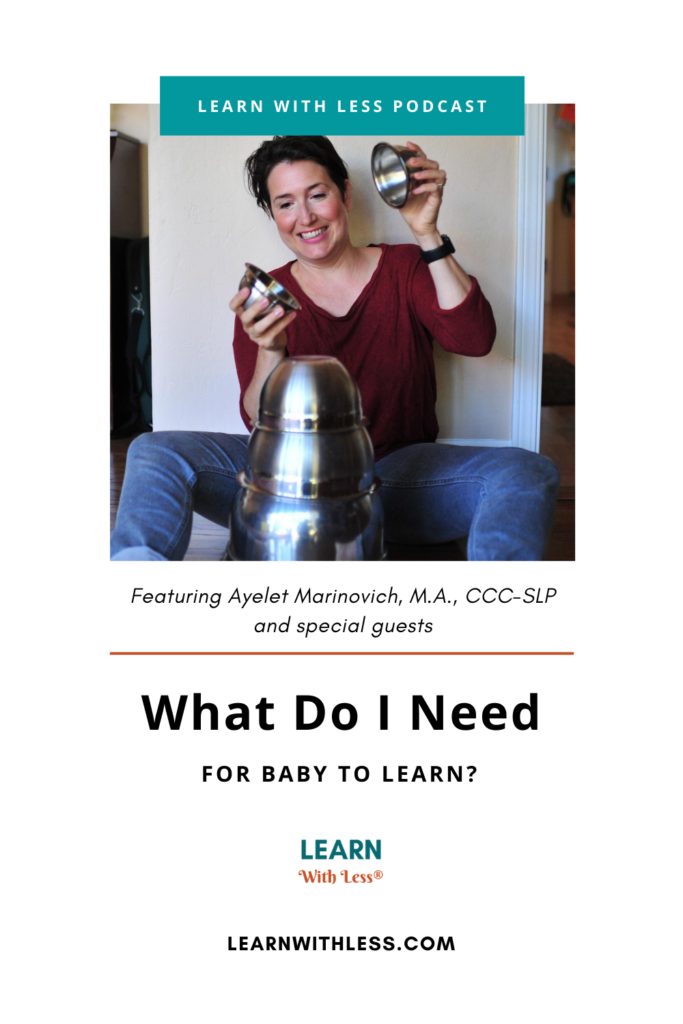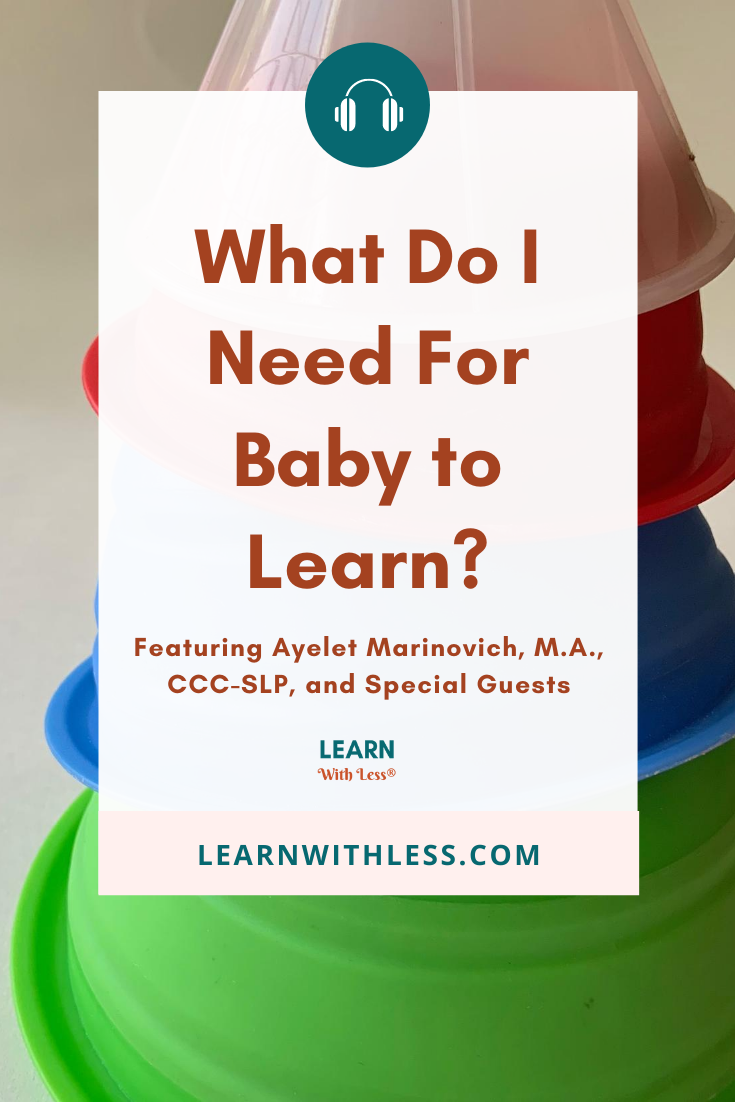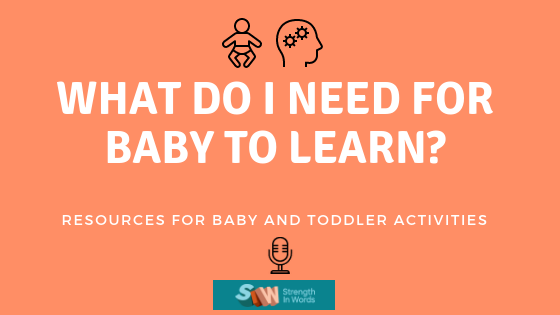How Do Babies and Toddlers Learn?

It’s so easy to get bombarded with the “stuff” of early parenthood.
Especially when hormones are “out of whack,” and the idea of getting more than a few hours of uninterrupted sleep seems years away.
The sense that we’re “winging it” is often all encompassing. We feel like we’re constantly playing catch up – which can be especially daunting for those perfectionists among us, or if we felt like we were pretty good at most things in life before parenthood.
So, we go out in search of the “best toys” to support our babies, or the “parenting expert” that can tell us the formula for sleep, discipline, introducing solids, potty training, or anything else we need to know – often right in that moment, and often desperately.
But let me tell you something…
We are all asking the same questions.
And our babies are all so very, very different.
In fact, when I incredulously placed my second child down in his bassinet “sleepy but awake,” (something that I had never ever done successfully with my first baby), I could NOT believe my eyes when he actually did the thing SO many of these so-called “sleep experts” said was supposed to happen.
I suddenly felt so validated – that it hadn’t been “my fault” – and that I simply had two tiny humans with radically different needs and preferences.
And what did I do first?
I called my mom.
I wanted to share my experience.
Learning Is Relational
I wanted to scream this information from the rooftops, and chat with every single new mom (and dad) I knew – about how some babies are sleep unicorns, and some simply have different preferences!
Because learning is relational. And we’re all learning off the cuff about how to parent each of our children.
But when we know more about how our babies learn and develop, and when we can compare notes with other families and have a sounding board about this crazy early period of time in parenthood…
Then we feel like we have options and ideas to know what our next steps are – even if we feel isolated at home with a tiny dictator.
I’d like to introduce you today to a series of parents and caregivers who have grown to feel supported and reassured – even as first-time parents, even if they weren’t raised with siblings, and even if they didn’t have much contact with babies most of their lives.
They’ve learned how to watch, observe, and discover their children – as well as what was happening to them – as they move through these first years of parenthood.
The first person I’d like to introduce you to is Gwen, who lived in the same part of London as I did when we first became moms.
Here’s how she describes journey into motherhood:
“I was a first-time parent. I’m an only child. In fact, myself, I didn’t grow up with siblings, I hadn’t had much contact with babies most of my life.
And so I came to motherhood with this being, feeling like a complete amateur, and, that’s a bit, I know I shouldn’t feel so critical of myself, but I felt, you know, a bit isolated and a little bit lost.”
Rachel, a speech-language pathologist who works primarily with adults, describes it in a different way:
“I felt really comfortable in the mom role. I’d been waiting to be a mom for a really long time…”
But at the same time,
“Motherhood is such a double-edged sword of feeling like you’ve got this, while simultaneously feeling like you have no idea what you’re doing.”
Lisa, a nurse practitioner, spoke about that overwhelm:
“And I think with the access that we have with social media, you know, oh, this is the thing to get, right? This is the thing to buy, you need this, you need that.
And then as a new parent you’re like, ok, well I guess I got to get that, but then you ended up just accumulating so much stuff that you know, I mean, where am I going to put it?
I have a small house, you know. I can’t always buy everything and then it might not really be useful. You know, you kind of get into the hype.”
Ok.
I think we can all agree that it would be AMAZING to just be able to drown out the noise… and discover what you actually NEED.
It really is fear-based.
As a new parent, you want the best for your kid. You want to make sure you’re interacting with them “right.”
Brooke, a marketing executive turned stay-at-home-mom, shared this:
“It wasn’t until about a month in that I felt like I wasn’t maximizing my time. And coming from a very stressful marketing job that was go, go, go all the time, doing multiple things. I mean, the amount of stuff that I got done in a day at that job is just, I mean, it blows my mind now.
You look at going from that to staring at this infant, and I just really was… I really had some struggling around how to, you know, make sure that I was doing the best job that I could as a new mom: now that I wasn’t in that marketing position, this was my new job! And I just felt like I didn’t have the resources to know exactly what to do.”
So, if you had a guide that told you – without you actually having to even pick up a book, and without you having to actually BUY ANYTHING – “if you do this, it helps this part of their brain develop,” would you be more inclined to actually do those activities?
Hidden Mysteries
Here’s the thing.
There are hidden mysteries behind how and what your baby is learning at every moment in those first three years.
So what if you could become a baby detective, uncovering the mysteries, so you never had to feel frustrated or bored?
What if you could discover how to connect with your baby through play, music, and movement… even if you don’t know the words to a single nursery rhyme?
What if you could discover how to give your baby the “right” stimulation, play, and interaction to develop – without ever having to hit the “buy” button on Amazon?
And what if you had a chance to actually observe other families doing the same kinds of activities, using simple, repurposed “toys” from their own homes, as well… even if you work full time or have limited offerings in your own community?
Here’s how Manuela, an actor and theater director, describes what she was able to gain in participation with the Learn With Less® Curriculum Online Family Program:
“Watch my child, and discover I wasn’t alone in discovering what was happening. So I was watching, observing, and together we used to discuss behaviors, our behaviors, too!
Not only our children, but also our reactions about them, about what was happening to us, as well. It was huge, it was huge.”
And Gwen, who you heard from earlier, described:
“Ayelet, she just brought us together and she created this community, which is a wonderful thing, which made me feel supported and reassured, and it’s just, it was such a wonderful warm feeling to meet… I think she just taught me that parenting is, is simple.
That you just need to get away from this tendency to just want to keep doing things, buying things, and reading books and so on. And you just need to sit back and observe your child and listen to them, and just let them lead you – as opposed to doing what instinctively I did, which was to want to lead her…
You gave moms so much confidence. I think that really is key. That’s what I was liking at the start. That is the key to so much of what parenting is, you know, and accepting that you’re not perfect. It’s a powerful way to guide our, our children. Parenting is such a marvelous journey of self discovery.”
Brooke feels that the community around the Learn With Less® Curriculum Online Family Program is different from what she’s found elsewhere.
“And moms are the worst to each other. I mean, really, the judgment comes from the other mom in the grocery store. And I feel like we just kind of put that on the back burner and we’re all there to really improve what we’re doing as mothers and parents, and make the most out of it for our kids.
So yeah, and as it’s grown, I think it’s been fun to invite like-minded women and men, and grandparents, and everybody in – caregivers of all kinds. And none of us are… and maybe I’m generalizing, but I don’t feel like it’s a “Pinterest mom” kind of group.”
Josh, a former high school teacher and the father of a toddler and new baby, shares this:
“I like the videos, reading the transcripts, there’s so much. You are very economic with your words and you’re very precise, which is beautiful because it doesn’t take long to read. They’re in small chunks, so I get them and I don’t feel like it’s interfering too much with my lifestyle.
And I love the posts that other people make, sharing, you know, we’re all in this together. It’s relational: learning is relational and that’s hard on line. It’s hard in an online community. So, you know, putting comments at the end and seeing what other people say, I mean, I forgot what the one mother said, it got me feeling and I wrote out all those thoughts. I was like, wow, that was really cool.
She just helped me really solidify a lot of what was going on in my mind, and look, that could not have happened if there weren’t other people involved. Yeah.
And it doesn’t all come from you. It comes from all of us, and you as that guide, creating that environment, creating an environment in which we explore and we look at and poke around and get frustrated with and figure out. So I love the interaction. I love the nuggets that I can chew on and come back to.”
A New Kind of Family Experience
So, what is the Learn With Less® Curriculum Online Family Program, and what do families get out of it?
Here’s Laura, who works full time and wants to savor the moments she has with her toddler daughter:
“It’s been an encouragement to move in the direction that I would like to be spending more time in. So, I have these buckets that I use to save water. So when we warm water for the shower, I fill up a bucket and then use that bucket to water the plants.
And my daughter’s super interested in the buckets and she just wants to play in them all the time, like splash around and get wet… and I sort of am like, ah, that seems cute and probably a good idea, but it’s such a mess, and I don’t have time…
And then I read one of the sensory play things and I was like, actually, like, that’s awesome. She’s interested in it. It’s free, it happens anyway. It’s like, it’s right there.
And so, it’s encouragement for me to like just step back and see that as an opportunity for her to engage and learn about like wetness and water and, just, you know, putting her hand in and seeing that it looks different under the water from above the water and gravity and just all these things and not worry so much about like, yeah, you’re going to have to change her outfit afterwards.
That’s not the end of the world, you know. So just encouragement that those things for her are valuable and it’s worthwhile…
It’s valuable to be reminded that that kind of thing is really valuable for her, and that there’s a reason to, to let that happen organically. And not have to like go to the swimming pool where I have paid for a swimming lesson in order for her to have her explore water.
You know, we could do it everyday in the bathroom. It’s just more integrated into our lives, which I think is a real positive.”
Rachel offered a similar sense of freedom as a result of participating in the Learn With Less® Curriculum Online Family Program – that sometimes…
“It’s one little sentence that can just like radically alter what you’re doing maybe in a moment, and you feel good about it. You feel like you don’t have to stress about it because it’s one tiny little thing, it’s one little detail and it’s just using what you already have.
But it’s also like a little revolutionary sometimes, especially when you are really tired and you’ve spent all morning and all you’ve really managed to accomplish is feeding everyone…”
Manuela and Gwen spoke together about their impressions:
“I think that the most valuable thing you gave us was really many different ways to connect with your child. So to discover how even very, very, very simple things. So this is the most valuable things I’ve learned. I think that is your work is to meet your child where they are. Acknowledge where they are.
And that’s just like 80% of the, the whole journey. It’s such an accessible approach in every way, including financially, but it’s, it’s really so encouraging and reassuring because it makes you realize that you can thread this into every single aspect of your day with your child.
You need to find out. Yes. It’s a way to learn how to see. And it’s personal. It’s totally individual and therefore it is perfectly suited to you and your child in that moment.”
Thank you Rachel, Brooke, Josh, Laura, Gwen, and Manuela for sharing your thoughts.
I’d like to invite you to learn more about learning with less. You can do that anytime by heading to strengthinwords.com/online to learn more about the program.
But I also want to tell you that I’m going to be holding a FREE live workshop on September 5, 2019, where I’m going to share how you can stop winging it and raise a great human from day one… without having to buy a single toy…
If you want to release the overwhelm, feel more like you’re “winning” it, and find support and community within the time you already have…
Then I invite you to attend the workshop! You can reserve your spot here: https://learnwithless.com/workshop

